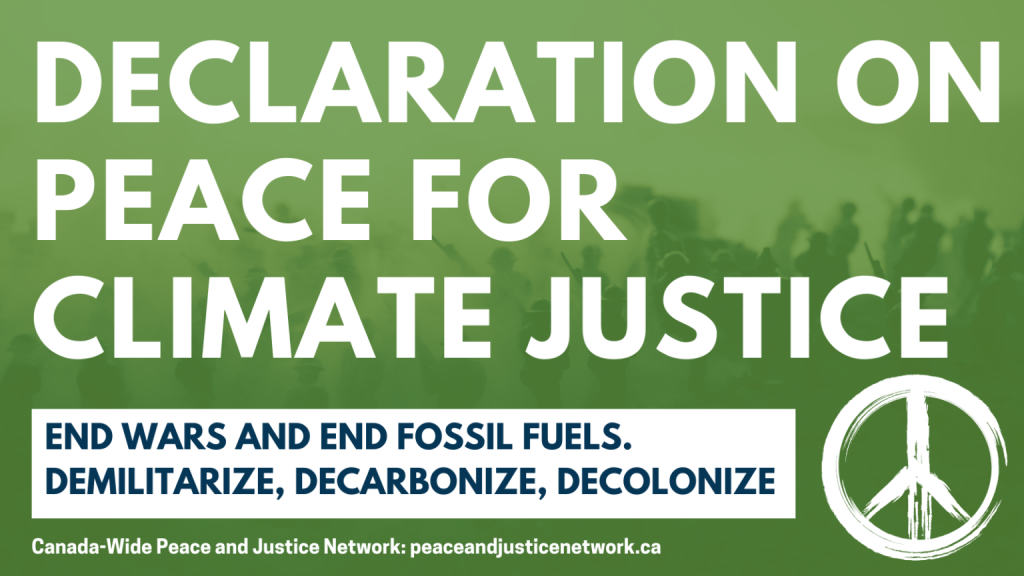
End wars and end fossil fuels: Demilitarize, Decarbonize, Decolonize – November 2023
We are in a climate emergency exacerbated by global conflict. This past summer, out-of-control forest fires raged across Canada and caused mass displacement and destruction. Canadian communities are facing more intense fires, heat waves, flooding and droughts, but are not prepared for these climate-induced disasters. The Canadian government has failed to reduce carbon emissions and adapt to climate change. The federal Commissioner for the Environment and Sustainable Development in the Office of the Auditor General reported that Canada is not on track to cut carbon emissions by at least 40% below 2005 levels and meet its 2030 target.
The Canadian government’s refusal to call for ceasefires for the wars raging in Gaza and Ukraine and continuing to send weapons is shamefully prolonging the conflict, causing human suffering and accelerating the climate crisis. With rising military spending and military emissions, Canada cannot rapidly decarbonize and meet its climate commitments. Since the 2015 Paris Agreement, Canada’s annual military expenditures have increased 95% to $39 billion this year as shown in the North Atlantic Treaty Organization’s (NATO) Defence Expenditures report. Canada is currently ranked 14th highest in the world for military spending and 16th highest for arms transfers.
Canada’s Department of National Defence accounts for over 60% of all federal government emissions. The federal government has recently announced plans to buy new fossil fuel-powered F-35 fighter jets and aerial refuellers, which are like pipelines in the sky. The government is also spending public funds for a new fleet of diesel-powered warships though the oceans are in peril. These weapon systems will lock our country into carbon-intensive militarism for decades without any credible plan to offset those emissions.
The Canadian military’s training and operations with the United States and NATO are intensifying global warming and risking war. Canada routinely deploys warships alongside American and NATO navies in the South China Sea. Canada is leading a NATO battlegroup in Latvia and training force in Iraq. Canada is also militarizing the Arctic, a fragile ecosystem, with air force and navy installations and exercises with the U.S. under the North American Aerospace Defense Command (NORAD).
The military’s claim it can offset its emissions to achieve net zero by 2050 is not a credible climate solution. The wars and weapons have to stop for mitigation. Nuclear energy and small nuclear reactors are also false solutions as they leave behind radioactive waste and risk nuclear weapons proliferation.
In its 6th Assessment Report, the Intergovernmental Panel on Climate Change (IPCC) stated that “International cooperation is a critical enabler of ambitious climate mitigation, adaptation and resilience.” Canada needs to end the wars and weapons exports and cooperate with all countries on averting catastrophic climate change and achieving the United Nations Sustainable Development Goals. Canada must withdraw from NATO and NORAD military alliances that are impeding global cooperation and peace and work with all countries through the United Nations system.
Peace is on the thematic program at the climate summit for the first time. Peace for climate justice means ending the wars against each other and the earth. It means cancelling fossil fuel powered weapons procurement, cutting military spending and converting from a war economy to a green care economy. Peace centres Indigenous land and water defenders and ends settler colonialism and extractive capitalism. A climate of peace is achieved through disarmament, demilitarization, environmental peacebuilding, cooperation, mutual aid and global solidarity. Peace for climate justice is the transformative change needed to secure a livable future.
To prevent catastrophic climate change, biodiversity collapse, mass starvation and war, we are demanding the Trudeau government:
- Call for ceasefires for all conflict and support peace plans to end the wars in Gaza, Ukraine, Yemen, Sudan and the Democratic Republic of the Congo
- Reduce and re-allocate military spending for climate action and climate finance
- Cancel the $74 billion fossil fuel-powered F-35 warplane procurement
- Cancel the $3 billion strategic tanker/aerial refueler procurement
- Cancel the estimated $5 billion procurement underway for remotely piloted armed drones that would be used by the military both for domestic surveillance and in foreign operations
- Cancel the $306 billion diesel-powered warship procurement
- Stop the $38 billion NORAD modernization and the militarization of the Arctic
- End the export of all arms and military technology
- Avoid nuclear energy and small nuclear reactors and join the Nuclear Ban Treaty (TPNW)
- Report all greenhouse gas emissions and offsets from the military
- Develop a national conversion plan with a just transition for the aerospace and defence sector to transform from a war economy to a green economy
- Invest in forest fire fighters, water bombers and green jobs not more soldiers and weapons
- Develop a non-militarized, civilian natural disaster response systems
- Withdraw from NORAD and NATO, the costly carbon-intensive alliances led by the U.S. military, which is the largest consumer of fossil fuel in the world and has launched many terrible wars over natural resources
- Invest in environmental peacebuilding, diplomacy and global cooperation to work with all countries to protect the planet, meet the Paris Agreement and achieve the Sustainable Development Goals
Sources:
Campaign Against the Arms Trade (2015) “Arms to Renewables: Work for the Future” report: https://caat.org.uk/publications/arms-to-renewables
Canada, National Defence, CAF Operations and Exercises: https://www.canada.ca/en/services/defence.html
Commissioner of the Environment and Sustainable Development to the Parliament of Canada (2023) Report 6—Canadian Net-Zero Emissions Accountability Act—2030 Emissions Reduction Plan: https://www.oag-bvg.gc.ca/internet/docs/parl_cesd_202311_06_e.pdf
Intergovernmental Panel on Climate Change (IPCC), 6th Assessment Report: https://www.ipcc.ch/
NATO Defence Expenditures Report: https://www.nato.int/cps/en/natohq/topics_49198.htm
Stockholm International Peace Research Institute (2023)
Small Nuclear Reactors: https://www.nationalobserver.com/2023/09/27/news/trudeau-warned-nuclear-weapon-risk-over-emerging-small-modular-reactors
Trends on World Military Expenditure and Trends on Arms Transfers, see www.sipri.org
WILPF Canada, Canada’s Carbon Bootprint: https://wilpfcanada.ca/wp-content/uploads/2021/11/01-Military-Emissions-and-Military-Expenditures_Fact-Sheet.pdf
Parliamentary Budget Officer (2023) “The Life Cycle Cost of Canada’s F-35 Program: A Fiscal Analysis” AND (2022) “The Life Cycle Cost of the Canadian Surface Combatants: A Fiscal Analysis”: https://www.pbo-dpb.ca/en
United Nations Sustainable Development Goals: https://www.un.org/sustainabledevelopment/sustainable-development-goals/

